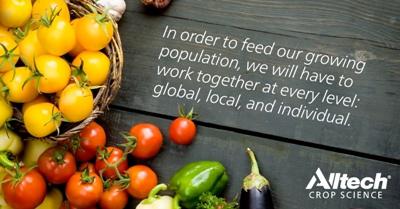The United Nations (UN) expects the population to grow to more than 9 billion inhabitants on Earth by 2050. Not only will there be more mouths to feed, but nutritional trends and consumer demands have introduced new challenges to agricultural production, especially in Brazil, the fourth-largest producer of food in the world.
This conversation gains prominence in October with the celebration of World Food Day, a date that highlights the importance of debating public policies and new technologies related to production.
For Dr. Steven Borst, global director of Alltech Crop Science, a company that supplies natural-based products for agronomy and horticulture, feeding the population both in terms of quantity and quality requires sustainable production practices.
“We need to do this together,” said Borst. “The use of sustainable solutions to improve yields and quality will help us. Food that could have twice the nutritional content found today would influence the quantity of production needed to feed the world.”
Some studies have indicated as much as a 40 percent decline in the nutrient value of fruits and vegetables over the last 70 years. For this reason, a pursuit of quantity must not leave behind methodologies that improve the quality of crop yield.
Walter Belik, founder of the Associação Prato Cheio and who is responsible for the food safety division of the Sustainable Development Goals project of the United Nations in Brazil, explains that fulfilling this growing demand without pressuring the environment is one of the main challenges.
“It is not worth it to increase food availability if there is no quality,” said Belik. “It would be a short-term solution, but if we look ahead, it could result in an enormous problem.”
According to Belik, the use of natural products in food production would be complementary to the implementation of new technologies in the field, promoting an increase in crop yields in a balanced way.
“These are clean technologies that can be used to save resources,” added Belik. “We can no longer create models where the balance of energy and the environment is disastrous.”
Additionally, healthier eating habits are influencing production at a global level.
“Consumers are demanding to know where, how and what is used in the production of the food they eat,” said Borst. “The result is that producers are beginning to focus on more and more sustainable approaches to production.”
(Press Release)




















